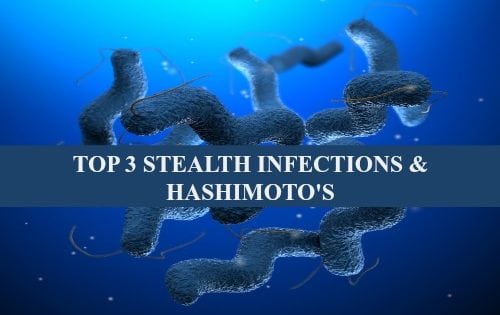Infections and Hashimoto’s is a popular topic. One question I get asked a lot is related to infections and what people are hearing about in Facebook groups or learning from “Dr. Google.”
It can be overwhelming so I wanted to share what I’ve learned through various thyroid medical conferences. Researchers have found there are three common underlying infections associated with Hashimoto’s.
The good news is that when these are treated, the autoimmune condition usually resolves on its own.
Please make sure you’ve been tested correctly for the following top 3 underlying coinfections associated with Hashimoto’s:
Yersinia enterocolitica (Y. enterocolitica) is an infection more commonly seen in people who have been diagnosed with Hashimoto’s than it is in people who don’t have an autoimmune thyroid condition.
It is associated with conditions such as inflammation of the colon, reactive arthritis and inflammation of the small intestine. If you have an acute infection, IgG and IgA antibodies will be present.
Treating the infection often results in the termination of the autoimmune attack against the thyroid.
Please be aware that stool testing is not reliable … only a blood test should be used to determine if there are elevated IgG and IgA antibodies.
Quest Diagnostics is the only lab I know that offers a blood test for Y. enterocolitica.
What to do if you test positive: Grapefruit seed extract (GSE) can actually rid the body of this infection when used under the guidance of a qualified healthcare provider.
Epstein-Barr Virus (EBV) is also commonly seen in patients with Hashimoto’s and is often overlooked. It depends on which antibodies were tested, or the practitioner may overlook an elevated early antigen IgG antibody as being normal. This actually happened to my husband two years ago. He was told his numbers were “normal,” when in fact, he had an active case of EBV.
With EBV, if you had, for example, mono as a child, your IgG antibodies to EBV will remain high long-term and even into adulthood.
However, if the early EBV IgG antibody is elevated, it does point to an active infection requiring treatment. A lab value of less than 9 is normal, whereas anything greater than 11.2 is not. Depending on the lab, a result greater than 11.2 may not be flagged.
You can actually self-order your own EBV test panel that includes the early antigen IgG antibody profile here if you want to do your own detective work. I encourage you to share the results with your provider, especially if the early antigen IgG antibody is elevated.
H. pylori is a bacterial infection often seen in people with thyroid disease. It infects the stomach and suppresses the production of acid secretion so it can survive. It’s a sneaky little creature.
As you probably already know, low stomach acid is often an issue for people with Hashimoto’s.
Although H. pylori is actually more commonly seen in people with Graves’ disease than Hashimoto’s, it makes sense to be tested. Stool testing is the gold standard for H. pylori. BioHealth Labs GI Pathogen with H. pylori (401H) panel is excellent to confirm or rule out H. pylori, ova & parasites, and yeasts, etc.
Remember that having Hashimoto’s does not indicate that you definitely have one of these infections. If you’ve been on a healing protocol for quite some time and not getting any relief from your symptoms it would be worth your time to be tested for all three.

